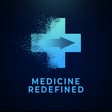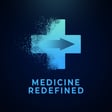Become a Creator today!Start creating today - Share your story with the world!
Start for free
00:00:00
00:00:01

155. Progress Note #18: The Surprising Benefits of Earthing/Grounding
In this episode, Dr. Darsh and Dr. Altamash share research on the positive benefits of earthing/grounding (putting our barefoot on Earth). They will discuss what it is, how we think it works, what the research shows, and how you can implement the practice in your routine.
Mentioned in the show:
Health Implications of Reconnecting the Human Body to Earth's Surface
Effect of Earthing on Inflammation
Earthing Influence on Physiologic Processes
Episode 135 - Acupuncture with Alex King, DO
Transcript
Introduction to Medicine Redefined
00:00:07
Speaker
Welcome to Medicine Redefined, a podcast focusing on helping you reclaim ownership of your health. I'm Dr. Darshah. And I'm Dr. Altima Sharaja. We're your hosts, here to challenge conventional practices and uncover the stories behind pioneers shaping the future of medicine.
Launch of Health Newsletter
00:00:22
Speaker
Our conversations not only focus on the individual level to dissect common practices for health optimization, but also zoom out to enhance systemic change. Join us as we look to break the status quo, move the needle forward, and put the help back in healthcare.
Progress Notes and Personal Updates
00:00:37
Speaker
Hey everyone, real quick, we are excited to share that we launched our newsletter. It contains high yield insights from our guests and tips and tricks from us. We wanna put the health back in healthcare and invite you to do the same by giving you the necessary information to live your best lives and provide value to those around you. Make sure to head to medicineredefined.com where you can input your email and stay up to date. Okay, time for the episode.
Exploring Earthing and Initial Skepticism
00:01:02
Speaker
All right, coming back to another progress note.
00:01:06
Speaker
medicine redefine. Dr. Darshan Shah, how goes it? All right, man. All right. Can't complain. Counting down the days to when I graduate residency. So that's been top of mind lately. So trying to figure out all that stuff and the move. So a little bit stressful, but live in life and join it. Can't complain. How about you?
00:01:25
Speaker
I can't complain too much. Yeah. No upcoming transitions, but not like yours, right? That's a big one, wrapping up training, closing one chapter, opening up a completely different one. So that should be exciting.
Benefits of Earthing for Health
00:01:38
Speaker
So today, this progress note is all going to be about earthing, and people might not recognize it as that name. And so another term for that that people might be more familiar with is grounding. I got to be honest, when you first reached out to me and you mentioned that this is something we're going to talk about, my initial thoughts were like, eh, really? This is what we're going to talk about. But as you do a little googling and go into the right resources and you read about it, you're like, oh, wow, there might be something to this.
00:02:07
Speaker
something to the hype. And so this is certainly more your area of expertise. But I think just to kind of from a lay persons and even my unsophisticated understanding of grounding and earthing, I will give an overview and then we'll
Earthing as Lifestyle Medicine
00:02:20
Speaker
let you take it away. Right. So earthing, also known as grounding, it's reverse discovery of the bodily contact with Earth's natural electrical charge. And the idea is that this stabilizes our physiology in a positive manner at the deepest levels. And that in turn has a host of benefits.
00:02:37
Speaker
Some are proposed benefits. Others have been actually demonstrated in some of the studies that you're going to talk about later. But simply said, it's just reconnecting the conductive human body, which we know it is, to the Earth's natural and subtle surface electrical charge.
Personal Journey into Earthing
00:02:54
Speaker
And the proponents of lifestyle medicine, which both of us are, are going to talk about how this might be something that is being overlooked. It's inexpensive. It's accessible to every single person out there. So barrier to entry is low. And it can have systemic influences because of the basic bioelectrical function of the body. And that can promote well-being. So how do I do with that?
Grounding's Impact on Body's Electrical Charge
00:03:15
Speaker
Yeah, perfect. Let me explain the reason why I brought this up as a topic, right? So my dad sent me a WhatsApp video saying, Hey, I was just thinking about your barefoot episode with Irene Davis. Here's a clip that I got sent from my friends. And it was this guy talking about like, Hey, here are two papers on grounding. And he was on the beach and talking about how there was a 30% reduction in glucose just from going barefoot in the sand. And like you, I was kind of like, okay,
00:03:42
Speaker
Let me go. There's no way that can be true. I was very skeptical. So I looked at the papers that were mentioned in that video and then also went to consensus, your AI tool. And I said, what are some of the top sources about grounding? And so three of the papers came on my phone, looked through those. And then the data was like, oh, wow, this is actually onto something here.
Lifestyle Medicine and Ancestral Living
00:04:04
Speaker
And I've always heard of grounding. And you're right. What it does is it's that transfer of electrons. We accumulate these positive
00:04:11
Speaker
electrons, just from pollutants, from environmental changes, from stress, all these things. Positive charge, you mean? Yes, positive charge. Yeah. So we collect this heavy positive charge, and then we ground ourselves to the earth, and there's this electron flow. And so the whole point of this is that there's a multitude of benefits from releasing that energy, essentially. And so a lot of people might think, hey, this is kind of woo woo, but if you
00:04:35
Speaker
truly think about it. I mean, everything in this earth that we live in is made up of atoms and electrons and the orbit. And so there's no reason to think that we aren't either, right? We absolutely are. And so everything is energy in the end and there is an electrical capacitance to us, right? I mean, look at our nerves. There's a reason we do EMGs and things and send ourselves electrical shocks that we diagnose even with electricity. So yeah, you did a wonderful job with that. I think one of the reasons I wanted to bring this up too is that
00:05:04
Speaker
both of us are very much proponents of lifestyle medicine. And one
Encouragement to Explore Grounding
00:05:08
Speaker
of the key factors that I'm seeing about true health more and more on social media is that people are starting to return to this ancestral way of living, right? Whether it's through meditation, whether it's just through good nutrition from the soil, organic, whether it's just proper sleep, whether it's getting active and not living a sedentary lifestyle, right? It's this return to how we used to live. And grounding is the fundamental aspect of that. I mean, we used to sleep on rocks, we used to
00:05:33
Speaker
run on grass chasing animals. We were so connected with the earth, and more and more, we're separating ourselves from nature. Yeah, right on. And that's not to say that all of the projects that we used to have were positive. Obviously, we made tremendous progress.
00:05:48
Speaker
I want people to get turned off by this thought. It's like, oh, here we go, ancestral ways. We made tremendous progress. I think much like anything else, context is everything in life. And you can pick and choose. And I certainly think that once we, if this even peaks the littlest bit of your interest, then I encourage you to look at some of the resources that are going to show notes, some of the things that you're going to talk about, and just educate yourself.
Grounding Effects on Diabetic Patients
00:06:12
Speaker
At the very least, there is theoretically a lot of sense to be made of this.
00:06:18
Speaker
The biggest thing is there's really not much to, well, I take that back. There is going to be things to sell, which maybe you'll talk about some things that came across. There are ways to monetize, so to speak. But again, as I said, it is accessible to every single person. So we've talked a little bit about what it is, right, and why it might be important.
00:06:37
Speaker
I guess maybe let's dive into systemically, what are some of the benefits that we talked about, particularly now the weather's warming up, right? People might want to, at least on the East Coast and of the world. Is this the East Coast of the West or West? The West, nowhere in the West of the world, excuse me. East Coast on the West, yeah. East Coast on the West, right.
00:06:57
Speaker
Well, no, I take that back. I mean, this is a little tangential. But if you're coming from Indonesia, you're going to fly east to get to us. Is that not true? Yeah, no, that's true. So for them, we're east, aren't we not? We're east. It's perspective. It's all context. It's all context. It's all context. Anyways, I digress.
00:07:15
Speaker
So people might say, OK, look, let me look into this. I know people love running on the grass and kids, and we all did that. You talked about sand people getting on the beach. So let's talk about some of the positive benefits that we alluded to earlier. You brought up the term glucose. I presume in that study they were looking at maybe average blood glucose or something.
Grounding and Sleep Quality
00:07:32
Speaker
I'm not really sure if that was fasting or whatnot, but why don't you dive into that a little bit?
00:07:36
Speaker
Yeah. So let's talk about glucose first. And everything that we're going to talk about grounding has to do with the autonomic nervous system. So we've touched on that in the past, so sympathetic versus parasympathetic systems. And so when we look at glucose, there was this one study where they took 12 patients with non-insulin dependent diabetes mellitus, right? So they took half the group and
00:07:58
Speaker
they checked their plasma glucose, right? And the units were about like 10, I don't know, micro, whatever it might be, right? It's probably done in Europe, so they use a little bit of a different factor. But both groups had similar fasting glucose is usually around 11 in their plasma, 10 to 11.
00:08:14
Speaker
one group grounded for 72 hours and they checked their blood glucose consecutive 24 segments so 24 hours 48 hours 72 hours and in the grounded group and let me backtrack here right so why did they choose these subjects
00:08:30
Speaker
All 12 of these patients were on oral hypoglycemic, right? So they were on some sort of medication, but after being six months on this medication, it was ineffective for them. And they were also on an ACE inhibitor. So for those that might want to know that, shorts of blood pressure medication, but also can have some benefit for people with diabetes. So they took this group, half of them grounded for 72 hours, half of them did not ground, and they looked at their plasma glucose afterwards.
00:08:58
Speaker
When I go back to that video of my dad saying, hey, there was this difference of 30% to 40%, that was true. So after 48 hours, we saw that plasma glucose come down to about eight, and then 72 hours come down to about seven. So apples to apples, when you compare a grounded group, 72 hours versus those who didn't, there was definitely a difference without an oral hypoglycemic agent. So they weren't even using anything external. So that, to me, I was actually kind of like,
00:09:27
Speaker
Well, that's pretty impressive, right? And the thought is that, again, it's working on a hormonal level, working on an insulin level, I guess, quote unquote, making you more insulin sensitive, but the magic of at least grounding yourself to reduce that glucose concentration in your blood. Yeah. It's interesting,
Analgesic Effects of Grounding
00:09:48
Speaker
right? So did they talk about what type of ground surface? Does that even matter?
00:09:53
Speaker
So, no, it doesn't necessarily matter. So that's a good background that we should talk about too. So you could do natural grounding or earthing, which is just going straight onto the grass, going onto sand. You can do things like concrete, but there's not as much capacitance or conducting about electricity. A lot of these studies though, they'll actually sleep on grounded pads. So you can actually hook it up like with a wall charger and it'll ground
00:10:16
Speaker
the electrons essentially from your body to that. And there's also grounding mats and there's also flip flops that have more of like a copper base on the bottom that will ground your feet.
00:10:27
Speaker
Yeah, yeah, I love that. And that goes back to the monetization piece that we talked about, right, is maybe for practical reasons, not not OK for you to to get out into the environment, get out into the wild. And the other thing is, you know, I do think this is did you come across what paper was this in twenty twenty review paper that I came across when I was looking at. Let me look at it. I think the author is is the many goes article in twenty two and explore. Did you come across that review paper? Really good review paper. I'll send it your way. I think that for me, when I'm looking at some topic that I'm very
00:10:57
Speaker
very superficially familiar with or know nothing about, I will almost start with a review paper. So I think this was relatively good. And it talked about the different benefits and whatnot. And they do a good job explaining some of the ideas in terms of, as you've already mentioned, why it's important and how it might work. So that's interesting.
Grounding and Inflammation Reduction
00:11:16
Speaker
So from a metabolic health perspective, later we're going to talk about inflammation. We know that chronic inflammation and ill metabolic health
00:11:23
Speaker
right, are tightly correlated. And so that makes sense. And, you know, maybe you didn't talk a lot about the mechanisms of action in terms of glucose, but is that something you're gonna do later on with inflammation or do you want to do that now?
00:11:38
Speaker
We can do that now. I mean, I think what the issue here is with the grounding and earthing research is that they still need to figure out why this happens, right? So what exactly is it about the earthing and the electrons and how is this even happening in the human body? Now I came across some papers that were talking about fascia and cartilage actually as being the conductors of the body where this electron transfer is happening.
00:11:59
Speaker
But again, every single paper I've read is like more research needs to come out to elucidate exactly why this is happening or more research needs to come out to really substantiate these claims that we are making. Yeah, that's the challenge of it. Right. And I think that's another thing. And I'll bring this towards you in terms of recognizing this is not a panacea, because as you'll see, we'll talk into
Muscle Recovery with Grounding
00:12:20
Speaker
right. So we have the glucose. You're going to talk a little bit more about sleep and how it's correlated with that in terms of pros and cons.
00:12:25
Speaker
And I was really interested to talk about the analgesic effects. And this is where a prior guest, Dr. Alex King, talked about how he uses acupuncture to utilize the, again, the protons, the electrons in the body and manipulate, so to speak, in order to obtain an analgesic effect. And so I thought that was quite interesting. But let's shift there from there. So another thing, I think this is a different article that you came across with respect to sleep, what we find there.
00:12:54
Speaker
Yeah. So this I think was the most fascinating to me, right? Because a lot of times when we talk about sleep, we talk about subjective data, right? So let's, let's delve into that. So in the one study, they took a group and they divided it in half. So you had two groups and one group slept on a mattress that was grounded and the other groups slept on a mattress as well. That was a placebo, not grounded to anything. And what they measured was time to fall asleep.
00:13:19
Speaker
quality of sleep, feeling rested, general wellbeing, and back and joint pain. So your expertise there. And so this is all subjective data, right? And again, they found a difference in those that slept on a grounded pad and everything improved as far as sleep goes. And they also reported reduced pain in joints and better overall wellbeing. And there was a pretty significant difference between the two groups in regards to that. That's pretty dope.
00:13:48
Speaker
Again, how many total subjects in this one? 12 in this one. Actually, no, just kidding. 12 was in the glucose one. 12 was in the other sleep one. I can't remember how much this one had.
00:14:00
Speaker
All right, so we can look that up. Yeah. So that's pretty awesome. Again,
Healing and Health Markers
00:14:07
Speaker
I wonder how, so again, this falls into environmental medicine, right? Just the earthing and grounding it in terms. Did they talk about other environmental factors that were controlled for or were not controlled for? Were these mats inside the people's homes or were they in a sleep lab?
00:14:22
Speaker
You know, I didn't mention, but what they did say was it was continuously grounded. The only times they weren't grounded was that when they had to get up to go to the restroom or anything like that, I'm assuming this was in their homes. Um, but it did not mention anything about a sleep lab. Interesting. I recently had a safe study done in lab, safe study done. It's a horrible experience. I had the at home one done a couple of years ago. That was doable. The in lab one is a horrible experience. I don't even know how they get accurate data considering how inconvenient it is for one to go to sleep.
00:14:52
Speaker
Like it just took 50 minutes to put the leads on my body. I'm not even exaggerating there. Jeez. Yeah. But again, I digress. So coming back to that, I mentioned earlier about the analgesic thing. I'm excited to share that with you now. So I'll tell you, again, this paper, I think if you guys are interested, I highly recommend checking this out in the Journal Explorer.
00:15:18
Speaker
But the analgesic properties of grounding, as you've already mentioned, as we go through light, we accumulate free radicals or reactive oxygen species. People talk about the benefits of antioxidant all the times, but basically these free radicals are positively charged molecules. So we accumulate them over time.
00:15:35
Speaker
And they stripped the electrons from the healthy tissue, right? So we have this deficiency. We have this electron deficiency, which potentially causes damage. And then also the free radicals are naturally produced in just our regular physiology, regular biochemistry. We're producing ATP, which is the currency for the cell. And it's the energy molecule. And every single cell in the body is going to make millions, if not more, billions of free radicals every single day.
00:16:06
Speaker
by just sustaining life. And so the idea of grounding, earthing, because the earth's surface is negatively charged, is to get those electrons in through our body where they can neutralize these free radicals, right? So it is, you can look at it as an antioxidant, so to speak.
00:16:23
Speaker
And the active mechanisms of the electron transport to a site of an inflammatory pathway, this can involve the nervous system. You already mentioned that. That's where nerve conduction studies. For those of you who don't know what that is, so if you've heard of the concept of an EMG to diagnose a neuromuscular condition, part of that EMG is not the whole test. It's half the test. Nerve conduction study where you get tiny shocks. A lot of you guys have probably already had it.
00:16:45
Speaker
So you can, the active transport can be from the nervous system I already mentioned. So the meridian pathway, right? Hashtag puncture there, and the circular systems as well, right? So your lymphatic system blood flow. And so this influx, they talk about free electrons are absorbing the body and serves as a powerful anti-inflammatory and reinforces the immune system.
Therapeutic Benefits of Earth's Charge
00:17:08
Speaker
So that's another thing that, you know, I remember Alex talking about,
00:17:11
Speaker
how sometimes acupuncture can cause a little flare after the fact. I'm even interested in looking at to see if there's any mention about plate-rich plasma. I'm thinking a lot about PRP and why it causes so much pain and so much of an inflammatory effect in the beginning and see if there is any positive or negatively charged valence to that. With respect to analgesic or anti-analgesic effect,
00:17:39
Speaker
There have been several studies looking at the evidence of grounding or earthing dramatic impact inflammation and pain. They've been doing this for nearly 20 years now. One of the first studies that came out, they had medical thermal imaging where they had pre and post grounding effects to see how that might have had skin changes and temperature changes on skin.
00:18:00
Speaker
And, you know, by coding of a different color. So that's really, really cool. I encourage you guys to check that out. The other thing I think is worth mentioning for people, if you're like, well, how the hell is, why does Earth have all these electrons just roaming around? I mean, we have to recognize that
00:18:15
Speaker
You know, it's affected by countless lightning strikes a year, solar radiation, other atmosphere dynamics, but also even, you know, land masses and bodies of water continuously like resupplying it with these atomic particles carved for your electrons, right? And so that's giving that negative electrical charge overall. That does beg the question, do we have a net positive charge or are we neutral?
00:18:43
Speaker
I'm not entirely sure what we start out with. I'm assuming we're net positive given how much of the accumulation we get throughout our lifetime. Interesting. Interesting to get it out, but yeah.
Grounding and Cortisol Levels
00:18:54
Speaker
Yeah. Cool. Where else should we go with this? What else did you find that was interesting that I think is worth mentioning here?
00:19:00
Speaker
So I think the second half of this sleep that I found more of the objective data. So in this one, they took 12 subjects, had some complaints of sleep dysfunction. I'm not entirely sure exactly what they reported for that sleep dysfunction, but they wanted to look at their cortisol levels. And so what we know about cortisol right now is that it peaks
00:19:18
Speaker
when we first wake up and then we have this regulation throughout the day, some fluctuations, obviously coffee and other type of caffeine can raise that. But then when we go to sleep, it should be kind of coming down and then rise up again in the morning. And that is what our circadian rhythm regulates. So they took these 12 subjects, had them ground for six weeks, and they measured their cortisol levels again.
00:19:39
Speaker
So when they measured it pre-study, a lot of their patterns were just not normalized. Some people had a huge variation in their cortisol. Some people had a very low peak in their cortisol. But when you look at the table in the paper, there's no real pattern. I mean, you see the pattern of cortisol spiking, but every once in a while it's individual.
00:19:58
Speaker
Six weeks later, you look at the table and it's almost as if the lines run over each other and everyone kind of normalized as far as their cortisol regulation goes. So I thought that was super cool just because there's so much talk right now about Ashwagandha and, you know, people talk about coffee in the morning and cortisol and when's the best time to drink your coffee? Is it right after waking or should you delay it? And, you know, there's all nuances to that. But, you know, that's where my mind went after reading this paper at least. Yeah.
00:20:28
Speaker
Yeah, I thought the whole coffee after awakening, like it's at 90 minutes, I thought that was washed over that. Is that still happening? People still bring it up. I think Hebermann does it. I do it actually, but I think I realized it's more I pour over coffee that gives me more of a sustained release rather than just drinking the first thing in the morning. I think it's the type of, it's the way I brew my coffee more than like a Starbucks cup with sugar. I think that's, yeah, so I think we are over it.
00:20:53
Speaker
Yeah, fair enough. Cool. Well, I like them. And this, you said this was 24 hour cortisol, right? Yes. Awesome.
Chronic Inflammation and Grounding
00:21:01
Speaker
So again, going back to probably some component of modulating stress, modulating inflammation.
00:21:09
Speaker
I think when as we're talking about this, that seems to be the central theme to me is, you know, we talk about and again, in the the paper that I referenced earlier in the twenty twenty review article, they talk about how this could be a therapeutic intervention for a lot of the non-communicable chronic illnesses, which is what we're plagued by in the twenty first century. Right. And
00:21:37
Speaker
We are also recognizing more and more that majority of them have some component of chronic inflammation. I want to be cautious here. I don't want people to think that inflammation is bad. Is it necessary? But I think uncontrolled chronic inflammation when it's not supposed to be there, and there certainly are times when it is supposed to be there and it's protective and it serves a purpose.
00:22:01
Speaker
But when it's not supposed to be there or it goes unchecked, that's when it becomes a problem. Think about all things that you're talking about. Think about somebody who has metabolic syndrome and they have some inflammation going on. You might be interested to know this. There are some recent studies coming out and some of the evidence is pointing to the fact that people who have metabolic syndrome, people who have pre-diabetes, type 2 diabetes are more predisposed to tendinopathy.
00:22:28
Speaker
And the idea is because they have a more inflammatory state and their tendon healing is compromised, right? And which makes sense to me because I do a lot of diagnostic ultrasound and one of the things that we look at, one of the hallmark
00:22:43
Speaker
Um, things that we look at on ultrasound is to see if there's any active inflammatory process in the tendon to characterize as tendonitis or tendinosis or even a blood flow and neovascularization. So that's pretty cool. And, um, also reminds us of the importance of, um, getting a handle on this, right? And if we're just, again, trying to promote wellbeing as the author said. So, um, yeah, that's those are my
DOMS and Physical Recovery
00:23:10
Speaker
thoughts there.
00:23:10
Speaker
You know, talking about the one thing on our outline too, it's about this Dom study that they did. How important is it to have that inflammation in the Dom state, right? So delayed onset muscle soreness for those who don't know what Doms is. Is it important to reduce that inflammation? Because again, this paper found by grounding, there was a difference in all the inflammation markers.
00:23:32
Speaker
Great question. I would love to get Mike Erzetel's opinion on this matter right here. Yeah, the underlying assumption behind this, and I did come across it, so they talk about this as well, is that DOMS is bad.
00:23:47
Speaker
And it's not, right? So delayed onset muscle soreness, for those who don't know, after you have a heavy workload on a muscle, typically after weight training, but it could be really type of stress, which is from eccentric stress. Eccentric, that means the muscle is contracting while it's lengthening. That causes the most amount of muscle damage. It could be, typically it's in the 24 to 72 hour period, but it can happen faster. For me, it does happen a lot faster.
00:24:12
Speaker
And so you're going to get this delayed onset muscle soreness. Some people will say, oh, if you didn't get this, you didn't necessarily cause any muscle damage. You're not going to get hypertrophy. That's also crap. We know that to be true. But DOMS isn't always a bad thing. Now, here's where it becomes a problem. If it goes unchecked, much like inflammation, or if it starts interfering with life, then we need to get it in check, right? There is too much. So if you have massive amounts of delayed onset muscle soreness and you cannot get out of bed for three days, four days in a row,
00:24:41
Speaker
or you can't do your job, or you can't walk straight, or you can't drive. So in this study that you're talking about, they looked at the gas truck soleus, right? So if your gas trucks are so ripped up that you cannot contract and you can't press the gas and the accelerator, well, now we've got a problem. Right now, we need to think about what we're going to do. And so I think, again, when I go back to the takeaway here is they utilize this outcome, delays on some of the soreness clinically, why that's relevant.
00:25:07
Speaker
But again, it goes back to the inflammation in the muscle. It was developed from the muscle damage that was done. So it keeps coming back to that part. Whether or not I'm going to use this to combat DOMS from this, I don't know about that, but you know. Right. Grounding after your workout. Just hit the calves really hard and then just go stand on the ground for 10 minutes. Love it. Love it. You don't want to compromise your gains though. Can't do it too close.
00:25:33
Speaker
Yes, right. That's right. Hour and a half, maybe. We got to find out timing. That's very true.
Incorporating Grounding into Daily Life
00:25:42
Speaker
Awesome, man. I think it probably makes sense, but to switch to talk about maybe some implementation strategies, if people do find this to be interesting. What thoughts do you have there?
00:25:52
Speaker
Yeah, so one of the things I was really interested in is, okay, well, what's the minimum effective dose, right? I've grounded before, you know, if I'm out going for a run, I want to meditate. I'll take my shoes off just because I knew about this theory. Did I really look into the research then? No, but that one probably going to do it a little bit more often when I go for my runs, especially as, again, as the weather is warming up. So I was looking online and some bloggers
00:26:14
Speaker
who have looked through the research have kind of agreed upon that the minimum effective dose is about 20 minutes being barefoot on the grass, on the sand, something that is with nature. If you're going to be on concrete, you probably have to do it longer. So you're better off just finding a park or a beach.
00:26:32
Speaker
Um, so that's kind of my viewpoint at least how I'm going to incorporate it is that, you know, as the weather warms up and I'm going to be outside, I might as well take even the 10 minutes, 15 minutes. I have noticed actually a difference in myself feeling calmer, um, after grounding, you know, or after going for a run. Now, is it due to the run and just being tired or is it actually the grounding? Who knows? But the research kind of points to me to try it out anyways. Is that 20 minutes a day?
00:27:00
Speaker
Uh, 20 minutes in order to have a guest, a quote unquote successful transfer of your electrons, like in order to have enough of an impact on your body at that time, in order to have any of these changes from what we're talking about from a system standpoint.
00:27:14
Speaker
understood. So it is something you could potentially consider doing on a PRN basis, right? It's not like the recommendation by the American College of Sports Medicine, where you need to have 150 minutes of moderate intensity exercise, you don't need to have necessarily 60 to 80 minutes of grounding. All right, I like it. All right, that's cool. So it's a it's like a PRN, if you need your Xanax, you go out just stand in the in the grass to see what that does for you.
Grounding Products and Health Practices
00:27:40
Speaker
And the reason why I'll say that too, is in one of the studies, they looked at Tour de France athletes or riders, and some of them ended up with like gnarly wounds on their legs and stuff. And after one session of just grounding, again, I'm not sure how long, but I think they were using grounding mats. There was like a significant difference in healing that was, that shocked the researchers to be like, wow, that should not look like that after day one. Um, so again, we didn't touch on it, but it's in the papers if people want to take a look. I love it.
00:28:07
Speaker
So you brought up mats, you brought up like beds and stuff. And certainly there's a market behind it. Not probably a strong market because I don't see it on market on social media, advertising social media. But what are some other options?
00:28:21
Speaker
Yeah. So there's also footwear. I was actually looking into this. There's like sandals or flip flops that you can wear that have copper on the bottom. And so that serves as a capacitance. So you can definitely look at that. And then again, we talked about Alex King and acupuncture. I think that ties in very well with what we're talking about because
00:28:39
Speaker
He is manipulating essentially the protons and energy balance in the body, and he is using the certain pathways like the meridians that you mentioned. And it's interesting, a lot of the footwear too will have the copper or have a point at apparently known as acupuncture point kidney one, which is under the metatarsals and at the sole of the ball of the foot. So that's the fun fact of the day. That is really funny. Yeah, that's I've heard stories of patients
00:29:09
Speaker
coming and having these points dialed in. I'll tell you a really funny story about a case that he wants Spencer to be. I highly recommend people to go check that episode out. I think he's the most recent one is where we dive a lot into acupuncture and the physiology of it.
Balancing Grounding and Exercise
00:29:25
Speaker
Hopefully, if things are clicking, if your electrical charges are firing in your brain and you're starting to understand, then I think that I'll go back and listen to that. It'll make sense because it didn't make a lot of sense to me the first time and now it does.
00:29:39
Speaker
I encourage that. What else should people look for, think about any last minute parting thoughts for you? Yeah, I think, you know, we're gonna have an episode coming up with Dr. Melissa Sunderman. And so this is definitely something, a topic that we're going to bring up with her as she is kind of the headstrong person going into nature as medicine for American College of Lifestyle Medicine. So she is the head of that committee.
00:30:02
Speaker
So we'll be talking to everything nature, um, in that episode. So that should be coming out shortly too. Um, so excited for that one. But yeah, I think, you know, if people are outside, just take the opportunity, test it out for yourself, see how you feel. Um, if you need a grounding mat and you already know you're doing like a meditation inside your home or somewhere, I think these are just easy ways to incorporate it. Um, if it fits your budget, like you said in the beginning, you know, this is not a panacea. This is not something that's going to solve all your issues. I think it's just a cool way of something that we're learning more and
00:30:32
Speaker
And just a great way for us to connect with nature again, right? I think we can all use that, get back to our roots a little bit. And there's more benefits than just grounding when we're in nature, right? Looking at the sunset, looking at the sun, getting outside, vitamin D. I mean, everything is connected. So I just think, you know, if people want to take advantage of all the things out there, they can. Yeah, I think that that's the one takeaway that I would encourage people to have. You know, a lot of times you and I sit down and we talk about interesting things and exciting things. And sometimes that's all they are.
00:31:02
Speaker
There might not be a clinical implication to this or there might be. It just depends on you. If you're already out there and it's summertime and my daughter loves to go out and play and play hide and seek in the yard, then maybe I might just dish their shoes and walk around
Conclusion and Reflections
00:31:15
Speaker
that. But you know me, I'm always the type of person who's thinking about, okay, well, what's the trade off and what's the return on investment and what's the cost for this?
00:31:25
Speaker
I would not recommend you to skip your 20 minute zone two bike ride to spend 20 minutes grounding. I do not think that that is a good trade-off right there. So that's something that I want to caution people with like, oh man, there's some good studies and they talked about that. So maybe instead of getting my exercise or certain training, I'll do this.
00:31:46
Speaker
That's not what we're saying here. So just keep in mind for those busy individuals, it's just context as we talked about, it's everything. And so I think with these types of simple plug and plays with environmental medicine, lifestyle medicine, it's like, what are we already doing and how can we add this? So I guess it wouldn't really qualify as habit stacking, but you talk about this a lot. You're like, what are you already doing and where can you implement this type of change to reduce the friction?
00:32:14
Speaker
I think grounding that's a good, great idea, right? Like throw it on your, if you have somebody has a balcony or you're making your cup of coffee in the morning, you're brushing your teeth, throw the grounding mat right there and just using that. You can also get sleepwear. So pillowcases, uh, get your mattress hooked up with some patches, you know, if that's expensive.
00:32:31
Speaker
No, so apparently it's a cover or you can actually like hook up patches to your body, but no, they're not that pricey. I think when I was going online and again, this contacts, but I think less than like a hundred dollars, right? So nothing that's in the thousands are super crazy. Um, that would, that would cost anyone too much. So cool. Awesome. Well, I learned a lot. Thank you so much. And, um, you know, hopefully you guys learned a lot and please check out those resources in the show notes. And until next time, man, sounds good, man. Yeah.
00:33:01
Speaker
An important update before you take off, we are now publishing episodes every other Monday. This will allow you to take your time listening to an episode, implement the lifestyle techniques you've learned, and solidify your knowledge with our newsletter. We thank you for your support of this podcast. If this episode speaks to you, please consider sharing it with your friends and family. We would also greatly appreciate it if you leave a rating and review.
00:33:24
Speaker
We would like to thank our team, Ethan Ju on video, Haritha Yapary on graphics, Zaina Blugmani on research, and Sarah Khan on newsletter. And as always, our disclaimer. Everything in this podcast is for educational purposes only. It does not constitute the practice of medicine and we are not providing medical advice. No physician-patient relationship is formed and anything discussed in this podcast does not represent the views of our employers. We recommend that you seek the guidance of your personal physician regarding any specific health-related issues.
00:33:51
Speaker
Once again, thanks for listening and we'll see you at the next episode.

















